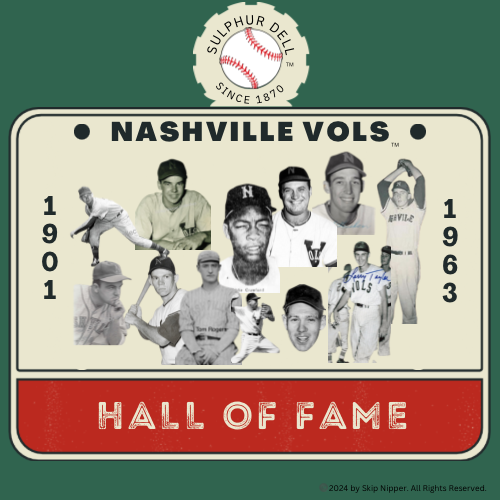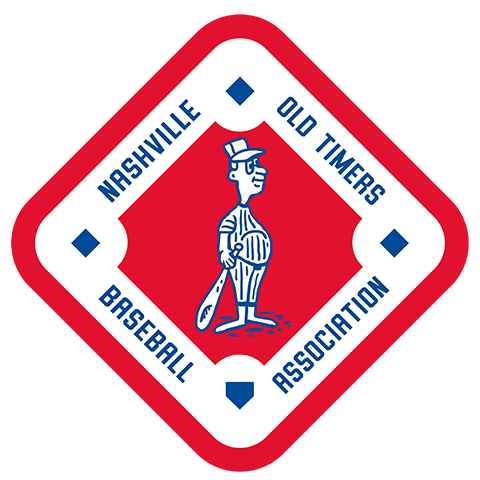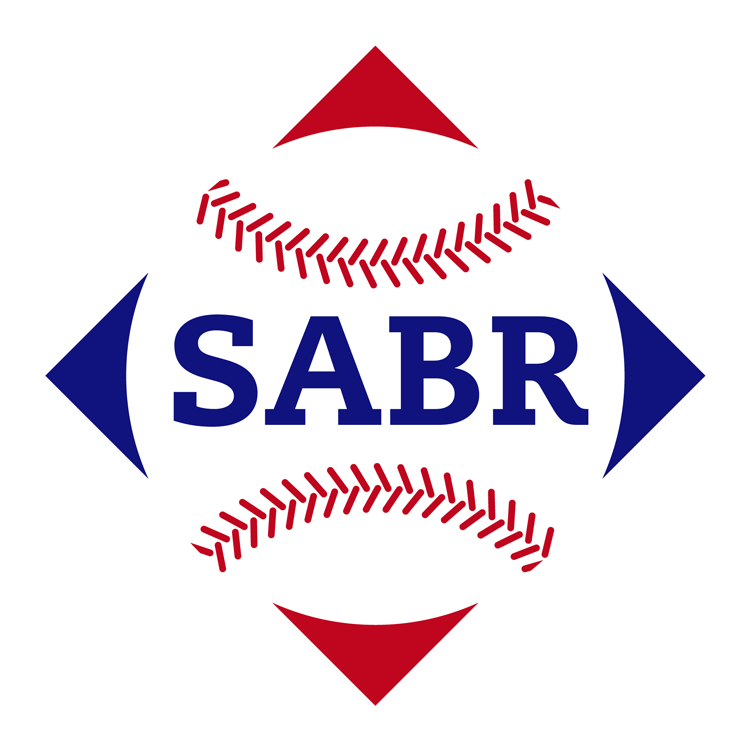
In his January 29, 1944, “Sideline Sidelights” column in the Nashville Banner, sports writer Fred Russell begins by writing:
“How’s your baseball judgment, your sense of player values, your memory of the Nashville Vols of other days?[1]
Now, that’s a long way off between the metrics of baseball today back to 1944, when most fans relied on their memory to judge player values, such as who was more valuable to his team: Vern Stephens or Nels Potter for the Browns or Stan Musial or Marty Marion for the Cardinals.
In the days when baseball was the only professional sport in town, the Vols at Sulphur Dell, and with World War II raging, thoughts often turned to the good old days when there was Peace and a day at the ballpark meant something more than the fan experience and home runs just about every inning, as it seems today.
Fred Russell was the fan’s sports writer, engaging his readers in almost every sport. Since baseball was what he loved best, he was always writing about baseball. The intricacies, the situations, the smell of the ballpark, how deep the flood water was at Sulphur Dell in the springtime, well, and just about everything else—he was Vin Scully in black and white.
In this article, he lists 20 Nashville ballplayers he had picked the previous year as Vols Hall of Fame members, asking readers to consider assisting him with recommendations on two additional players to add to the list. Popular votes will decide, he writes, and he picks a time frame for players to choose from: 1901 through 1943. Although the Nashville baseball team was not known as “Vols” until 1908, when Russell’s mentor, Grantland Rice, named the club, it is still appropriate to name choices to include 1901 through 1907, too.
Here’s the list of 20, with a little bit about each player and the year of their most successful season as a Vol. He starts with the catchers, and there are three:
- Greek George (1940),
- Johnny Gooch (1932)
- Gabby Street (1915)
For the pitchers:
- Tom Rogers (1916)
- George Pipgras (1925)
- Tiny Chapman (1935)
- Benny Frey (1929)
- Vito Tamulis (1942)
- Hub Perdue (1909)
- Byron Speece (1934)
The infielders include:
- Les Fleming (1941)
- Jay Partridge (1930)
- Charlie English (1942)
- Art Redfern (1926)
- Bill Rodda (1937)
And rounding out the players who played in the outfield for the Vols:
- Kiki Cuyler (1923)
- Hank Leiber (1934)
- Lance Richbourg (1933)
- Oris Hockett (1940)
- Phil Weintraub (1934)
Russell does not tell how many total votes for the inaugural Vols Hall of Fame class, but he does write that Kiki Cuyler received the most votes with 3,017, followed by Hank Leiber, Greek George, and Tom Rogers, in that order. Around 125 players had votes placed.
Russell goes on to list players who fans might consider, and of course, they could vote for whomever they wish besides these:
Catchers:
- Eddie Phillips
- Johnny Peacock
- Eddie Kenna
Pitchers:
- Ray Starr
- Russ Meers
- Ed Morris
- Paul Erickson
- Floyd Kroh
- Bill Crouch
- Red Lucas
Infielders:
- Jake Daubert
- John Mihalic
- Dick Culler
- Bob Boken
- Lonny Frey
Outfielders:
- Poco Taitt
- Stanly Keyes
- Hugh Hill
- Bevo LeBourveau
- Doc Wiseman
Who did the fans name as the two new inductees in the Vols Hall of Fame? Russell decided to wait to respond since so many Nashville fans were serving in the military, and he thought their votes were worthy, too, and rightfully so.
While I cannot locate the new selections after the War ended, and I do not think he did as a follow-up to that 1944 article, I can find an article Russell wrote a few years later, published on March 21, 1950, in his Banner column now named “Sidelines,” and he takes a new look.
“Suppose the past half-century split into two periods, 1901-1925 and 1926-1950, and al All-Star Nashville Vol club selected for each of the 25-year stretches,” he wrote.
“Not right off, of course.” He goes on to say. “The assignment would require a lot of thought, much stoking of the brain, plus almost endless comparisons. All I’m going to do today is to present some of the standouts from both periods.”[2]
It is a long list, even broken down by infield position, but here goes:
1901-1925
Catchers:
- Newt Fisher
- Gabby Street
- Doc Seabaugh
- Gibby Gibson
Pitchers:
- Vedder Sitton
- Hub Perdue
- Tom Rogers
- Bill Herman
- George Pipgras
- Floyd Kroh
- Red Lucas
- Eddie Morris
- Shovel Hodge
First Basemen:
- Jake Daubert
- Gene Paulette
Second Basemen:
- Ed Abbaticchio,
- Tommy Sheehan
Shortstops:
- Doc Lowney
- Roy Ellam
Third Basemen:
- Humpy McElveen
- Red Smith
- Art Kores
Outfielders:
- Hugh Hill
- Doc Wisemnan
- Kiki Cuyler
- Lance Richbourg
- Bevo LeBourveau
- Harry Welchonce
- Jack Farmer
- Fred Eichrodt
- Mike Burke
- Bill Stellbauer
1926-1950
Catchers:
- Eddie Phillips
- Eddie Kenna
- Johnny Gooch
- Greek George
- Carl Sawatski
Pitchers:
- Boots Poffenberger
- Benny Frey
- Del Lundgren
- Tiny Chaplin
- Vito Tamulis
- Byron Speece
- Bill Crouc
- Russ Meers
- Paul Erickson
- Leo Twardy
- Boyd Tepler
First Basemen:
- Les Fleming
- Tookie Gilbert
- Jim Poole
Second Basemen
- Johnny Mihalic
- Bill Rodda
- Jay Partridge
- Hank Schenz
Shortstops:
- Dick Culler
- Woody Williams
- Buck Redfern
- Lonny Frey
- George Scharein
- Charlie Brewster
Outfielders:
- Hank Lieber
- Phil Weintraub
- Oris Hockett
- Charlie Gilbert
- Charlie Workman
- Ed Sauer
- Babe Barna
- Poco Taitt
- Stanley Keys
- Moose Clabaugh
- Hal Jeffcoat
- Joe Dwyer
Obviously, players during the 1950s and early 1960s are not listed, and there were some great ones: Jack Harshman, Bobby Durnbaugh, Bob Lennon, Bob Kelly, and I could go on and on. You could recommend some, too.
Just write to me at [email protected], and let me know. You may also leave a reply below.
Here’s why: together, we will choose a Nashville Vols Hall of Fame, and since the ball club disbanded after 1963, we have over 60 years of players to choose from. You can go to baseballinnashville.com, and at the top of the Home page, you will find a list of every Nashville Vols player I can find from website databases, newspaper articles, and even from my Nashville Vols scorebook and scorecard collection, which numbers about 200.
I have spent many years accumulating the list, so click “Nashville Vols” at the top of the page (you can also access the Home page at sulphurdell.com) and make your list. I want to hear from you!
[1] Fred Russell, “Additions to Vol Hall of Fame,” Sideline Sidelights column, Nashville Banner, January 29, 1944: 5.
[2] Fred Russell, “Spitting the Half-Century,” Sidelights column, Nashville Banner, March 21, 1950: 22.
© 2024 by Skip Nipper. All Rights Reserved.



